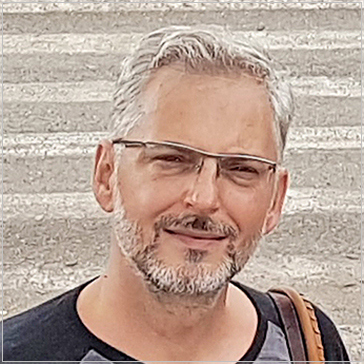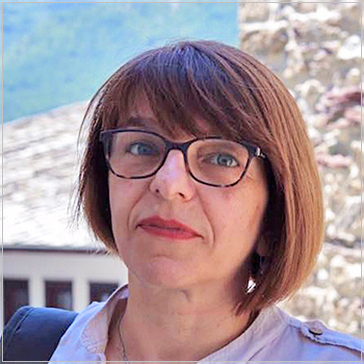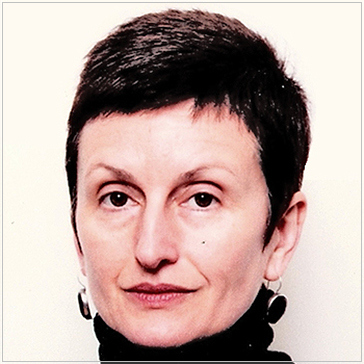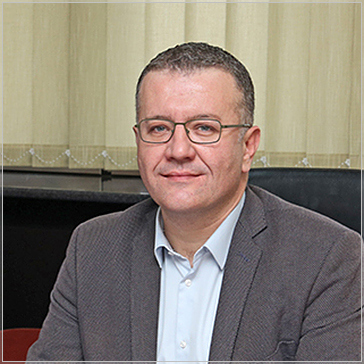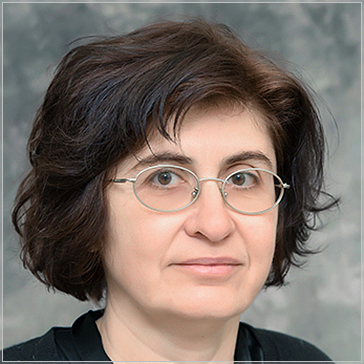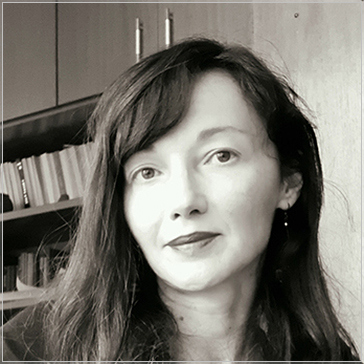Institute of Classical Studies
FOUNDING, DEVELOPMENT, AND ACADEMIC PERSONNEL
The Institute of Classical Studies is one of the first units at the Faculty of Philosophy, which commenced with its activities in 1946 as a Seminary of Classical Philology. Its founder, and, at the same time, the first Dean of the Faculty of Philosophy in the 1946-1949 period, was professor Mihail D. Petruševski. As Chair, first of the Seminary, and then, later, of the Department of Classical Philology, professor Petruševski laid the foundations for the further growth of the educational and scientific activity of the Department. In 1950 he initiated the publication of the academic journal in Classics “Živa Antika”, and was its first editor-in-chief. This journal, which is still regularly published, achieved prominence in the academic world, and, as such, a number of renowned names send in their articles to be published in it from numerous countries worldwide, which has resulted in its international status as a journal recognized even by UNESCO.
By 1956, professor M. D. Petruševski was teaching all the core courses, in
cooperation with his teaching assistant, Anastas Tahovski. During this period,
professor Milan Budimir, PhD, and professor Miloš Đurić, PhD, both from the
Faculty of Philosophy in Belgrade, joined in as guest lecturers.
The year 1956 marks the year when this branch of the Faculty of Philosophy
evolved into a Department of Classical Philology, with the additions of Bogdan
Stevanović, PhD, brought in to teach History of Ancient Greek and Roman
Literature, Elena Zografska, as a lecturer in Ancient Greek, and Petar Hr.
Ilievski, as a teaching assistant in Greek and Latin Historical Grammar. In
1958 Borka Josifovska was taken on as a lecturer in Latin. After Petar Hr. Ilievski
defended his doctoral thesis and became assistant professor in 1961, two more
teaching assistants joined the Department teaching staff: Jani Filovski in
Ancient Greek, and Ljubinka Basotova in Latin.
From 1977, in accordance with the new Law on Higher Education, the Department of Classical Philology became an educational and scientific unit of Classical Studies, and from 1988 it was grew into the Institute of Classical Studies.
The number of teaching staff and associates expanded over time, as they
obtained higher academic titles: in 1957 professor Mihail D. Petruševski, PhD,
received tenure by becoming full professor; in 1961, assistant professor Bogdan
Stevanović, PhD, became associate professor, and in 1967 – full professor; in
1956 Petar Hr. Ilievski, PhD, was taken on as teaching assistant, in 1960,
following the defence of his doctoral dissertation, he became assistant
professor, in 1966 – associate professor, and in 1971 – full professor. In 1972
the teaching assistant Jani Filovski and Ljubinka Basotova became lecturers in
Ancient Greek and Latin; in 1978 Ljubinka Basotova became a lector in Latin, in
1982 senior lector, in 1994 she became associate professor, and in 1999 – full
professor in Normative Latin Grammar. In 1971 Elena Zografska became a lector
in History of Ancient Greek and Roman Literature, and in 1982 she became senior
lector in the same subjects. In 1969 Borka Josifovska became senior lector, and
following the defence of her habilitation thesis in 1974, she was promoted to
associate professor in Latin. In 1974 Elena Koleva was brought in as a lecturer
in Ancient Greek, in 1984 she became a lector in Ancient Literature, in 1992,
following the defence of her doctoral dissertation, she became assistant
professor, in 1994 – associate professor, and in 2000 she became full
professor.
In the 1980s, the Institute of Classical Studies became better equipped with faculty. Margarita Buzalkovska was taken on as junior teaching assistant in 1980, and in 1986, after having obtained her MA, she became teaching assistant in Historical Grammar of Latin. Once she had obtained her PhD in 1996, she became assistant professor, then in 2001 – associate professor, and in 2006 – full professor. In 1986, Vitomir Mitevski, MA, became teaching assistant in Ancient Literature; after receiving his PhD, in 1990, he became assistant professor, then in 1995 – associate professor, and in 2000 – full professor in Ancient Literature. In 1985 Vesna Tomovska was taken on as a trainee, and in 1986 she became junior assistant; after having obtained her MA in 1994, she became teaching assistant in Ancient Literature. After receiving her PhD, in 2003, she was elected into assistant professor, in 2008 she became associate professor, and in 2013 – full professor. In 1987 Vesna Dimovska was taken on as junior assistant; after the defense of her master’s thesis, in 1995, she became teaching assistant in Normative Latin Grammar; she obtained her PhD in 2000, and one year later, in 2001, she became assistant professor in Normative Latin Grammar; in 2006 she became associate professor, and in 2011 – full professor. In 1986 Danica Čadikovska became lecturer in Ancient Greek and Latin.
In 1993 Valerij Sofronievski became junior teaching assistant in Ancient
Literature; he became teaching assistant in Ancient Greek after he obtained his
MA in 1996, and assistant professor in Ancient Greek in 2001, after having
obtained his PhD in 2000; in 2006 he became associate professor, and in 2010 –
full professor. In 2001 Elena Džukeska, MA, became teaching assistant in
Historical Grammar of Ancient Greek and Historical Grammar of Latin; in 2009,
after the public defence of her doctoral thesis, she became assistant
professor, in 2014 – associate professor, and in 2019 – full professor. In 2001
Ratko Duev became junior teaching assistant in Ancient Literature; after
obtaining his MA in 2003, he became teaching assistant in Ancient Literature,
in 2010, after getting his PhD, he became assistant professor, in 2015 –
associate professor, and in 2020 – full professor. In 2011 Svetlana Kočovska,
MA, became junior teaching assistant in Latin; then, after her doctoral defence
in 2014, she became assistant professor, and in 2019 – associate professor.
The teaching faculty at the Institute of Classical Studies hold classes with students at the undergraduate and post-graduate levels at the Faculty of Philosophy and Faculty of Philology – History, Archival Science, Art History, Archaeology, Philosophy, Gender Studies, Romance Philology, General and Comparative Literature, Albanology.
Starting from 1958 and moving up to the present day, a number of active
collaborations have been established at an international level, enabling the
Department members to participate in numerous international conferences in European
countries (Germany, England, Bulgaria, Italy, Spain, the USSR, Slovenia,
Croatia, Greece, Poland, Serbia, and others), as well as in the US, and foreign
professors to hold guest lectures to the Classical Studies students (Greece,
Romania, Bulgaria, Poland, Croatia, Serbia, Slovenia, the USA, the United
Kingdom, and others).
Three professors from the Institute of Classical Studies, professor Mihail Petruševski, PhD, professor Petar Ilievski, PhD, and professor Vitomir Mitevski, PhD, are full members of the Macedonian Academy of Sciences and Arts.
AWARDS AND RECOGNITIONS
In recognition of the enormous contribution in the sphere of science and education, members of this Institute have received prestigious social awards:
Academician professor Mihail D. Petruševski, PhD, received the highest national award, “11 Oktomvri” on two occasions, once in 1971, as a lifetime achievement award, and then in 1976 for his translation of Skenderbeg by Grigor Prličev. In 1982 he received the most prestigious social award in the former SFRY, the “AVNOJ” award, as a lifetime achievement award.
Academician professor Petar Hr. Ilievski, PhD, also received the “11 Oktomvri” award on two occasions, once in 1972 for The Damaskin of Krnino, and then in 1990, as a lifetime achievement award, as well as for Balkanological Studies (Балканолошки студии).
Professor Ljubinka Basotova, PhD, received the “Vangja Čašule” award for her translation of the City of God by Augustine of Hippo from Latin into Macedonian; the “Grigor Prličev” award for her translation of Vergil’s Aeneid. In recognition of her translation activity, she received the “Kiril Pejčinović” award, while the Association of Literary Translators declared her Master of Literary Translation. In 2006 she was honoured with the highest national award, “11 Oktomvri”.
Professor Elena Koleva, PhD, received the national award “Kliment Ohridski” in 2009, in recognition of her ongoing contribution in teaching and education in the Republic of Macedonia.
Professor Margarita Buzalkovska-Aleksova, PhD, was awarded the “Zlatno pero” by the Macedonian Translators Association in 2006, for her translation of On the Soul by Aristotle from ancient Greek into Macedonian.
Academician professor Vitomir Mitevski, PhD, received the city of Skopje award “13 Noemvri” in 2008.
ADDITIONAL ACTIVITIES: CONFERENCES, PROJECTS, AND INTERNATIONAL COOPERATION
The Institute of Classical Studies, in cooperation with the Ancient Studies
Society and the Association of Classical Philologists “Antika”, has organized
or been involved in the organization of several academic gatherings:
1. 1st academic convention “Antiquity and the Ancient
Heritage of our Lands“, held in Ohrid, September 15-19, 1977, with classical
philologists from all the republics that made up the former SFRY.
2. 8th international colloquium of Mycenaean Studies, held in Ohrid, September 15-20, 1985, with Mycenologists from a number of countries worldwide.
3. 5th convention of the Association of Ancient Studies Societies of the SFRY “Greco-Roman Antiquity in Yugoslavia and the Balkans”, held in Skopje, September 26-29, 1989.
4. International conference “50 Years of Živa Antika”, held in Ohrid, December 4-8, 2000.
5. International scientific convention on the occasion of the 60th anniversary of the founding of the Institute of Classical Studies “Antiquity and European Science and Culture”, held in Skopje, November 21-22, 2006.
6. International scientific convention and annual conference Euroclassica “Aeternitas antiquitatis”, held in Skopje and Ohrid, August 27-30, 2009.
7. International scientific conference Studia Classica Anniversaria, on the
occasion of the 70th anniversary of the founding of the Institute of
Classical Studies, held in Skopje, November 22-23, 2016.
From 2005 to 2008, the Institute of Classical Studies, in collaboration with the Association of Classical Philologists “Antika” and the University of Neuchatel in Switzerland, carried out the project “Development and Implementation of Master Studies in Didactics of Classical Languages” (Развој и инплементација на мастер студии по дидактика на класичните јазици), financed by the Swiss National Foundation of Science within the program SCOPES. Two summer schools were held within this project, Docendo discimus I (June, 2006) and Docendo discimus II (July, 2007), as well as a number of workshops, with secondary school teachers of classical languages as participants, as well as postgraduate students, and general high school and medical high school students. The two-year work resulted in a new curriculum designed for the post-graduate studies in the didactics of classical languages, as well as in the publication of the manual and CD ‘Docendo discimus’ (April, 2008).
Faculty and associates of the Institute of Classical Studies participated in the international project carrying out research of the ancient historical sources Pyrraichmes – Kumanovo and the region as a link among the Thracians, Dardanians, and Paeonians in antiquity (2000-2006).
In 2019, the Institute of Classical Studies received financial assistance by the Faculty of Philosophy in Skopje to carry out the scientific-research project Establishing the needs and perspectives for the renewal of the classical high school in the Republic of North Macedonia (as a preparatory secondary school for future students of the Faculty of Philosophy) (Утврдување на потребите и потенцијалите за обновување на класичната гимназија во Република Северна Македонија (како подготвително средно образование соодветно за идните студенти на студиските програми на Филозофскиот факултет)), and among the activities planned within the project was a public discussion on “Why do we need a classical high school?”, held on November 26, 2019, at the Faculty of Philosophy in Skopje.
The academic personnel at the Institute of Classical Languages, both faculty and associates, have published a number of scientific and academic articles in journals, books, university and secondary school course books, translations of renowned ancient literary works into Macedonian (Homer, Hesiod, Plato, Aristotle, Cicero, Horace, Aeschylus, Sophocles, Euripides, Demosthenes, Ovid, Virgil, ancient lyrics, Vitruvius, and others).
The Institute of Classical Studies collaborates closely with the Association of Classical Philologists “Antika”, as well as with the Bureau for the Development of Education; it is involved in the preparation of the course curricula for Latin and Ancient Greek taught in secondary schools; has been co-organizer of the state competition in classical languages for decades; and holds an advisory role in connection with the teaching of classical languages.
STUDY PROGRAMS
The Institute of Classical Studies at the Faculty of Philosophy in Skopje has implemented continuous changes and additions to its study programs, partly due to the legal requirements brought about by the reforms in the regulations concerning higher education, as well as, to a large extent, due to the innovative ideas of the academic personnel in the creation of new academic content.
At present, the Institute of Classical Studies offers classes at all three levels of higher education. There are three study programs at the undergraduate level: Classical Philology, with two optional modules – Ancient and Byzantine Studies; then, Latin Language and Ancient Literature; and Ancient Greek Language and Ancient Literature. The single-major study programs offer optional modules: Macedonian, and French and French Literary-Cultural Studies. The post-graduate studies offer two streams: Ancient Literature and Byzantine Studies, and Classical Languages and Mycenology. The doctoral studies offer two optional modules: Classical and Byzantine Literature, and Classical and Mycenaean Philology.
Besides the study programs that offer students the study of classical languages from a normative and historical perspective, as well as study programs that focus on the study of ancient literature in accordance with the research interests of the academic personnel, there are also study programs that deal with ancient culture, ancient mythology, ancient religions, music, poetics, rhetoric, and Byzantine studies. There is ongoing interest for the courses offered by the Institute of Classical Studies by students from other Institutes and Departments from the Faculty of Philosophy and the Faculty of Philology, as well as from other Faculties within the University, as shown by their preferences for the offered open elective and optional courses, which enables the Institute to achieve a significant and fruitful collaboration with the other academic units making up the University.
The academic personnel at the Institute of Classical Studies: Prof. Vesna Tomovska, PhD, Prof. Vesna Dimovska, PhD, Prof. Valerij Sofronievski, PhD, Prof. Elena Džukeska, PhD, Prof. Ratko Duev, PhD, Prof. Svetlana Kočovska Stevović, PhD.
Teaching Staff
ECTS Coordinator/Librarian:
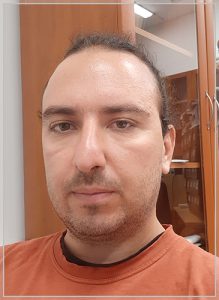
Marjan Kalevski
Senior Library Associate
Phone: +389 2 3116 520 ext. 208
Email: marjank@fzf.ukim.edu.mk

